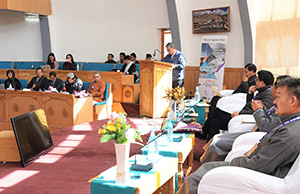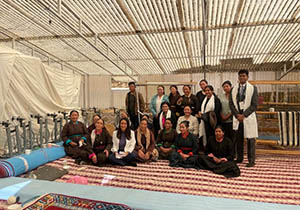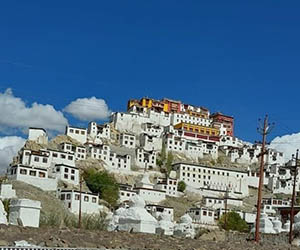LEH/SHIMLA: Representatives of Himalayan Mountain states have sought amendment in the rules of Extended Producers’ Responsibility (EPR) to make them mountain-friendly to tackle the menace of single-use plastic and trash in the Himalaya.
Representatives discussed threadbare the implications of the EPR authorisation and its rules at the three days long Sustainable Mountain Development Summit (SMDS-XI).
SMDC summit is a flagship program of the Integrated Mountain Initiative (IMI) that was held from 12th October to October 14, 2022 in Leh.
The meeting of Mountain Legislators’ Meet(MLM), which was one of the component of the SMDS-XI, was chaired by the Chief Executive Councillor of the Ladakh Autonomous Hill District Council, Shri Tashi Gyalson.
They came up with a declaration to amend the Rules of Extended Producers’ Responsibility (EPR) as applicable for the Mountain States.
This came as a corollary to the Declaration of the MLM held in Darjeeling in 2021.
“Endorsements from other Mountain States’ Legislators and MPs will be sought to take the SMDCs’ declaration to amend EPR rules to the central government, said Ramesh Negi(ex-Chief Secretary, Arunachal Pradesh) from IMI.
After MPs endorse the declaration, it will be followed by a meeting with the officials of the Ministry of Environment, Forest and Climate Change(MoEFCC).
“We will seek an amendment to the EPR framework to bring in specificities that mountain states need to meet the climate challenge”, Negi said.
This year, MLM was centered around the issue of Extended Producer Responsibility(EPR).
Extended producers responsibility is a mechanism that aims to reduce waste mainly plastic waste by increasing recycling and decreasing dependency on new raw material.
EPR moves the cost of managing post-use products partially or fully from local government to the producing industry.
EPR is a policy tool which requires producers to be responsible for the packaging they place on the its products in market at the end of the life.
Many cities around the world have packaging producer responsibility to bridle plastic and trash crisis.
EPR authorization is mandatory for producers of electrical items and single used plastic in India. EPR authorization is given by the central pollution Control Board under MoEFCC, Government of India.
With the EPR India authorization the manufacturers or importer of electronic and electrical products has been given the responsibility to control e-waste, byproducts after expiry of their lifetime.
Menace of trash and plastic threaten ecology of the Ladakh due to high influx of tourists.
IMI had targeted the summit in Ladakh as it has a fragile and unique landscape and environment.
It is ecologically threatened by climate change and also faces high challenges due to the huge influx of tourists.
Tourism boom has led to some amount of re-thinking and reflection by the many stakeholders including the Tourism department of Ladakh, UT.
It was therefore in the fitness of things to delve deep into this existential issue.
In 2021, Ladakh had received 3.15 lakh tourists soon after the Covid pandemic restrictions were eased up in this newly carved out Union Territory.
Before MLM meeting, SMDC summit began with the Himalayan Youth Summit on the October 9th.
It saw a galaxy of participants and speakers from across India and the world.
The theme of the Youth Summit was ‘Sustainability and Entrepreneurship’.
The youth attending both in person and online came up with a declaration which was presented to the MoEFCC Minister Sh. Bhupender Yadav during the inaugural function of SMDS-XI.
The same was presented to the President of IMI during the valedictory function.
The main theme of SMDS-XI was ‘Harnessing Tourism for Sustainable Mountain Development”.
The main organisers were Sustainable Forum of Ladakh (SDFL), the Ladakh chapter of IMI, along with the Office of the Ladakh Autonomous Hill Development Council (LAHDC).
The Summit had delegates from all the Mountain States and Governing Council Members of the IMI.
Many questions surfaced which were dealt with by a variety of speakers representing different fields of expertise.
The issues echoed in full in the talk the Lieutenant Governor, Ladakh, Shri R. K. Mathur delivered to the youth participants.
The same was echoed by the Chief Guest at the inaugural function, Shri Bhupender Yadav, Union Minister, Ministry of Environment, Forests and Climate Change.
He resonated with the views expressed by the Youth in their declaration and well as those by Shri P. D. Rai, President of IMI and the CEC, LAHDC, Shri Tashi Gyalson.
He gave his assurance to look into all the recommendations that would come out of the Summit.
During the 3 days summit, various technical sessions were devoted to delving deep into issues of environmental sustainability, tourism products, security and others.
It was apparent that the uniqueness of Ladakh needed much more thought that needed to be considered through the tourism products, regulation and policy, waste management, water security, energy security, and regeneration and protection of landscapes.
The issues of gender, culture and changing patterns of livelihoods figured prominently. Inputs received from the resource persons were interesting and insightful as it came from all across the Himalaya and other Mountain regions of the world.
Sustainability and security were also discussed in a session which was Chaired by Shri Ram Madhav of India Foundation.
The GoC, 14 Corps and Shri P. Stopdan of Ladakh International Centre also participated in the session providing their valuable inputs.
The Ladakh Tourism Festival was inaugurated on the 13th which would go on for a few days more, which has become a good tourist draw as well.
The summit was sponsored by the UT of Ladakh and LAHDC along with others.
The University of Ladakh was active in its participation including the Office of the Principle Chief Conservator of Forests, Shri Jigmet Takpa.
IMI will mainstream the learnings and outcomes from the summit to other States and Districts of the Indian Himalayan Region, said President.




